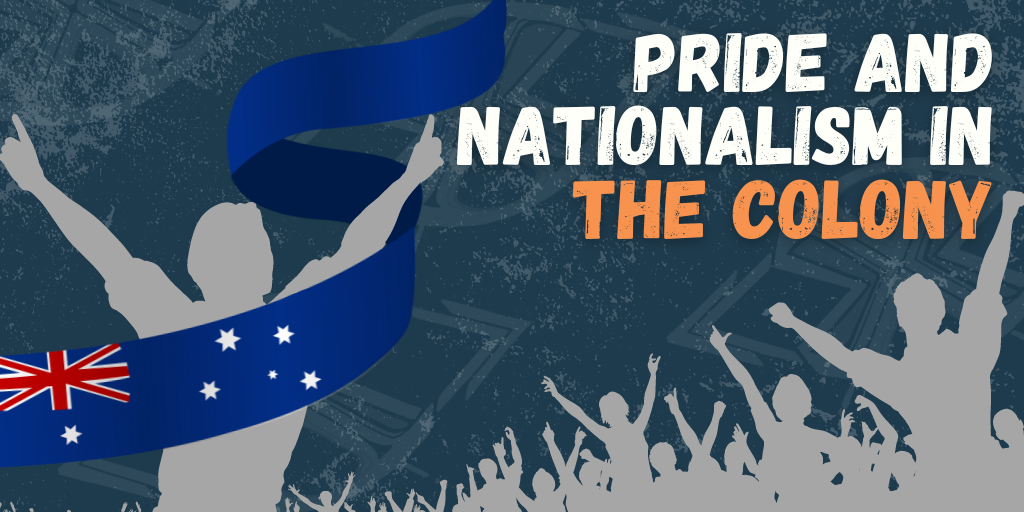Pride and Nationalism in the colony

Aussie Pride. A beauty to behold in all its forms; lamb ads, green and gold school uniforms on our Olympians, 2GB and a casual small protest/riot at a Meanjin woolies.
Despite national pride being something that every so-called Australian should be expected to feel, the nationalism of white Australia is vastly different to the nationalism of Blak Australia.
Nationalism is defined as ‘loyalty and devotion to a nation.’
Lenin, a communist and political leader and theorist from the Soviet Union describes nationalism in his works as ‘chauvinistic’, based in ethnocentrism. Lenin states that oppressed nations have a right to self-determination. Nationalism has very different functions for white vs Blak Australia.
Nationalism of the oppressor vs the nationalism of the oppressed.
Nationalism in Australia has been used to justify child removals, Boundary Roads, stolen wages and slavery, the White Australia Policy and just about anything awful that’s happened on this continent.
Nationalism for First Nations in Australia has been used to fight, rally and call for equality, equity and change. It calls for land back, for treaties, for culture and community. It gives us healing, shows our progress and in the colony is an act of rebellion against 250 years of bullshit.
When I was in high school, I remember my drama teacher talking to us about national pride. She said how she never understood ‘Australian pride’ and she would never refer to herself as a proud Australian. However she didn’t share with us any thoughts or insight that would condemn the past of this country, the treatment it gives to non-white folk or any other minority.
Rather, her feelings were based on the fact she personally had done nothing to earn a spot in the country – she just happened to be born here, it was nothing but luck that she was here rather than anywhere else.
At 15, I felt weird about what she had said. At the time I didn’t have the knowledge or vocabulary to question if her reasoning was perhaps a bit shallow, devoid of any political or social criticism and I didn’t have the words to explain why it made me feel uneasy, but it did. I remember thinking that what she’d just said didn’t apply to me – I’m proud to be Aboriginal, but at the time I wasn’t equipped to debunk her ‘born into it’ stance.
Now, 13 years later I can articulate why I felt like her argument didn’t apply to me and brought me unease.
This woman got to float through life as a blonde straight white woman. In the place where her biggest stress was marking and lesson planning, mine was classmates knowing where I lived, following me home and shouting slurs at my house. Mine was peers referring to any scholarship I got as “black money”, telling me I looked ‘apeish’ and telling me to ‘go back to the dreamtime’.
I had earned my pride as an act of defiance where she was simply born into hers, and was choosing to opt out of it.
‘Aussie Pride’ is repetitive and getting boring
Supermarket giant Woolworths recently announced they were no longer stocking Australia Day items and paraphernalia. Not for any good reason like morals, for example, but rather because the items were no longer as profitable as they once were.
Of course the Australian public reacted very normally to this.
In Meanjin, a small protest took place at a woolworths where disappointed and upset white folk vandalised the outside of the store and set off a flare inside. It wouldn’t suprise me if these same people also didn’t boycott woolworths when asked by the retail union since white pride and capitalism are best friends.
To be honest, Australian pride’s not even that interesting anyway, and a little confusing at times. For starters, is the colour pallette green and gold or blue white and red? Our national free to air stations are living 15-20 years in the past with gladiator reboots and attempts at an Australian ‘The Office’.
Genuine question, what do you have to be proud for?
The pride of Australia is rooted in its bloodied history. Violence seen in every corner of the nation from its national sporting codes, music, politics and day to day life. The foundation of this nation was genocide, colonisation, war crimes and crimes against humanity and that’s what the national pride stands on today. You weren’t simply just born here, the colonial patriarchal systems that this country was founded on affords you the very privilege to flippantly decide that ‘luck’ is the only reason you shouldn’t have national pride.
White pride and Australian pride are typically used to incite violence. Opposingly, Blak pride is the love and joy felt during NAIDOC, it’s smoking ceremonies at every gathering, lingo, the murals for footy players in Redfern, Blak women wearing weaved earrings, the glitz and glamor of Miss First Nations, Brooke Blurton on The Bachelorette, “who your mob? Oh do you know this person/last name?”, it’s knowing how all your Aunties have their teas.
It’s love and defiance and a message to our Ancestors and Elders that we’re thankful they fought hard for us. A message to our future generations that we’ll fight hard for them.
It’s the pride of one nation (pun intended) vs the pride of 500 nations.
That’s what pride and a nation should be shouldn’t it? Love, ambition, defiance, faith in each other and an easy connection to each other.
Built off strength and resilience and the audacity to still be here despite it all.
It’s a fire in my stomach and a swell in my chest when I see mob succeed that a white person would simply never understand, and for all those reasons and more, I’ll say it loud.




